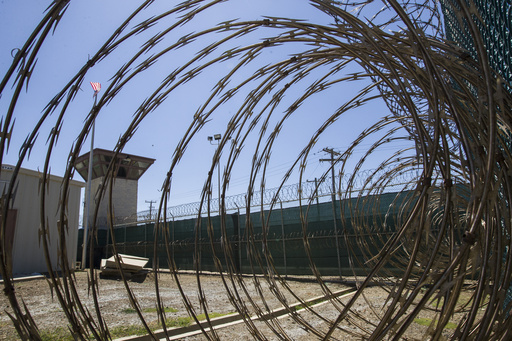WASHINGTON — On Thursday, the Biden administration successfully intervened to prevent Khalid Sheikh Mohammed, the alleged mastermind behind the 9/11 attacks, from entering a guilty plea that would protect him from the death penalty. This latest development prolongs the ongoing efforts by various U.S. military and governmental entities to achieve justice for one of the deadliest terrorist attacks in American history. It also adds yet another layer to the complexities surrounding the military prosecution that has faced numerous legal and logistical challenges over the past two decades.
A panel of three judges in an appeals court decided to temporarily halt Mohammed’s planned guilty plea, which was set for Friday at the military commission court located at the U.S. naval base in Guantanamo Bay, Cuba. In an unexpected action, the Biden administration is seeking to void a plea agreement that was negotiated by its own Defense Department with Mohammed and two co-defendants involved in the 9/11 plot.
Khalid Sheikh Mohammed is charged with orchestrating the horrific plan to hijack aircraft and crash them into prominent landmarks including the World Trade Center and the Pentagon, with another plane crashing in Pennsylvania. Some relatives of the nearly 3,000 victims of the attacks had already gathered in Guantanamo, expecting Mohammed to take responsibility for his actions during one of the darkest periods in the nation’s history.
Elizabeth Miller, who lost her father, a firefighter, during the attacks, expressed her distress over the situation. She leads a group of 9/11 families advocating for the plea agreements and opposing capital punishment for the defendants. Miller perceives the plea deals as a way for families to achieve closure. “It’s unfortunate that the larger government isn’t recognizing it,” she stated during a phone call from Guantanamo.
Conversely, Gordon Haberman, who lost his daughter in the attacks, viewed the situation more optimistically, suggesting that if the intervention leads to a full trial, he would support that course of action.
The appeals panel made it clear that their order would remain in effect only until they had fully considered the arguments presented, clarifying that it should not be interpreted as a conclusive ruling. Future actions are expected to unfold on January 22, extending the legal battle into the Trump administration.
Defense attorneys had aimed to finalize the guilty pleas before Donald Trump’s inauguration on January 20. It remains uncertain whether Trump will take any action regarding the ongoing military commission proceedings.
Defense Secretary Lloyd Austin has been at the forefront of efforts to nullify the plea agreements, asserting that decisions involving the death penalty in an attack of such severity should be left to the defense secretary’s discretion. Defense lawyers have criticized the attempt to discard the agreement, labeling it as part of the government’s ongoing mishandling of the case over the last two decades. They insist that the deal is valid and argue that Austin lacks the legal authority to abolish it retroactively.
This conflict places the Biden administration at an impasse with the military officials it appointed to oversee the justice process related to the attacks. The negotiated plea deal, which took two years to finalize and received approval from military prosecutors and the Pentagon’s senior official for Guantanamo this past July, includes life sentences without possibility of parole for Mohammed and his co-defendants and obligates them to answer any outstanding questions from victims’ families.
Over the 17 years since charges were filed against Mohammed, the 9/11 case has been marred by legal and logistical issues. Pretrial hearings are ongoing, with no trial date established. A significant hurdle has been the alleged torture of Mohammed and other defendants while in CIA custody, which could render their statements inadmissible in court.
This summer, military prosecutors informed families that the senior Pentagon official in charge of Guantanamo had approved the plea agreement, describing it as “the best path to finality and justice.” However, Austin’s unexpected announcement on August 2 to cancel the agreement triggered a series of legal challenges. After the Guantanamo judge and a military review panel upheld Austin’s intervention, the Biden administration escalated the matter to the District of Columbia federal appeals court.
Mohammed’s legal team contended that Austin’s intervention signifies his failure to properly oversee the delegate he appointed for Guantanamo operations. The Justice Department has emphasized that if the guilty pleas were accepted, it would deprive the government of pursuing a public trial and seeking capital punishment for those charged with a crime of such magnitude, which led to thousands of fatalities and shocked the nation and the world.




